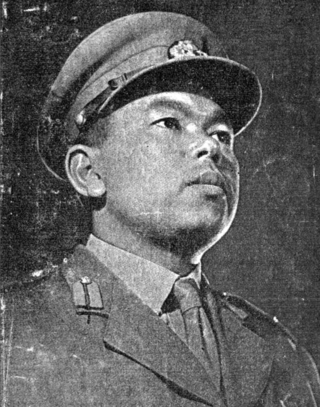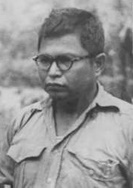
The hammer and sickle is a communist symbol representing proletarian solidarity between agricultural and industrial workers. It was first adopted during the Russian Revolution at the end of World War I, the hammer representing workers and the sickle representing the peasants.

The Anti-Fascist People's Freedom League (AFPFL) was the dominant political alliance in Burma from 1945 to 1958. It consisted of political parties and mass and class organizations.

Kyaw Zaw was one of the founders of the Tatmadaw and a member of the Thirty Comrades who trained in Japan in the struggle for independence from Britain. He was also one of the leaders of the Communist Party of Burma, and had lived in exile in Yunnan Province, China, since 1989 after retiring from politics.

Thakin Than Tun was a Burmese politician and leader of the Communist Party of Burma (CPB) from 1945 until his assassination in 1968. He was uncle of the former State Counsellor of Myanmar Aung San Suu Kyi.

Thakin Soe was a founding member of the Communist Party of Burma, formed in 1939 and a leader of Anti-Fascist Organisation. He is regarded as one of Burma's most prominent communist leaders.

Brigadier General Aung Gyi was a Burmese military officer and politician. He was a cofounder of the National League for Democracy and served as president of the party.

Thakin Kodaw Hmaing is considered one of the greatest Burmese poets, writers and political leaders in the 20th century history of Burma. He is regarded as the Father of Burmese nationalist and peace movements as well as a literary genius. His legacy and influence on the post-war generations can still be felt in both literature and the ongoing political situation in Myanmar (Burma).

The first fourteen years of post-independence Burma were marred by several communist and ethnic insurgencies. Prominent insurgent groups during this period include the Communist Party of Burma led by Thakin Than Tun, the Communist Party (Burma) led by Thakin Soe, the People's Volunteer Organisation led by Bo La Yaung, the Revolutionary Burma Army (RBA) led by communist officers Bo Zeya, Bo Yan Aung and Bo Yè Htut, and the Karen National Union (KNU).

The Kachin Independence Army is a non-state armed group and the military wing of the Kachin Independence Organisation (KIO), a political group of ethnic Kachins in Northern Myanmar. The Kachins are a coalition of six tribes whose homeland encompasses territory in China's Yunnan, Northeast India and Kachin State in Myanmar.

The Burma Workers Party, until 1958 the Burma Workers and Peasants Party, was a communist party in Burma, formed on 8 December 1950 by leftist elements of the Socialist Party. In December 1962 it merged with the People's Comrade Party to form the United Workers Party. In March 1964, it was among the many parties banned by decree of the Revolutionary Council.
The Democratic Movement for National Liberation was a communist organization in Egypt from 1947 to 1955. HADITU was led by Henri Curiel. The movement followed the line of the National Democratic Revolution.
Thakin Lwin was a Burmese politician and trade unionist, writer and journalist. He was a leading member of the anti-colonial Dobama Asiayone movement, a parliamentarian, the president of the Trade Union Congress (Burma) and a prominent leader of the Burma Workers and Peasants Party.
The Burma Socialist Party, initially known as the People's Freedom (Socialist) Party or PF(S)P, was a political party in Burma. It was the dominant party in Burmese politics after 1948, and the dominant political force inside the Anti-Fascist People's Freedom League. Because of its inclusion in AFPFL, it was colloquially known as ဖဆဆိုရှယ်.

The Communist Party of Burma (CPB), also known as the Burma Communist Party (BCP), is a clandestine communist party in Myanmar (Burma). It is the oldest existing political party in the country.

The Communist Party (Burma) (Burmese: ကွန်မြူနစ်ပါတီ (ဗမာပြည်)), sometimes referred to as the Red Flag Communist Party (Burmese: အလံနီကွန်မြူနစ်ပါတီ; RFCP), was a communist party in Burma. The party was formed after a more radical faction broke away from the Communist Party of Burma in 1946. In the same year, it began a protracted armed insurgency; first against British rule, then against the Burmese government. The party was led by Thakin Soe, a firebrand communist leader. In the 1970s, the party lost influence and was militarily defeated by 1978.
Thakin Tin Mya was a Burmese politician who served as political commissar in the Seventh Military Region of the Burma National Army.

The United Wa State Party is the ruling party of Wa State, an autonomous region in northern Shan State, Myanmar (Burma). It was founded on 3 November 1989 as a merger between the Burma National United Party (BNUP) and several smaller, non-communist Wa groups. Its armed wing is the United Wa State Army (UWSA), and its chairman and commander in chief is Bao Youxiang.

The communist insurgency in Burma was waged primarily by the Communist Party of Burma and the Communist Party (Burma) from 1948 to 1989. The conflict ended when the CPB, severely weakened by an internal mutiny, disbanded its armed wing.
The Communist Party of Arakan (CPA), also known as the Arakanese Communist Party (ACP), was a communist party and armed insurgent group active in Arakan, Burma. It was founded in 1962 after a faction under the leadership of Arakanese political leaders Kyaw Zan Rhee and Bo Maung Han broke away from the Red Flag Communist Party (RFCP).
Phyu Gyi was a Burmese boxer and Lethwei fighter from Burma. He is a former multiple-time flag champion.













